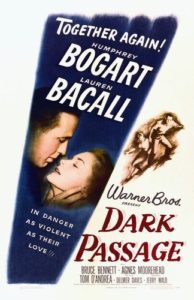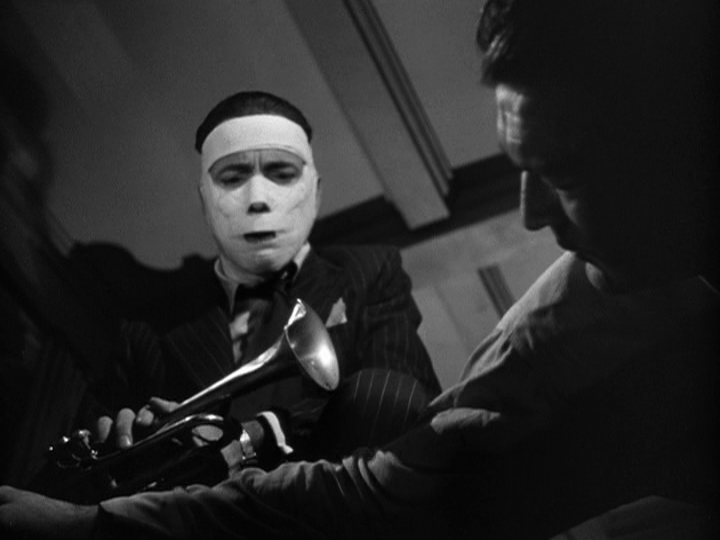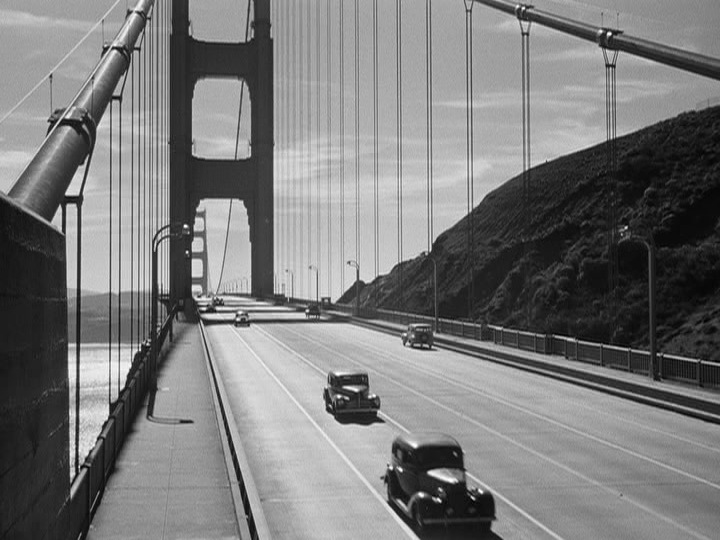“Was I insane to pick you up on the road? Was I insane to let you stay here?”
|

Synopsis:
A man (Humphrey Bogart) wrongly accused of murdering his wife escapes from prison and stays with a friend (Rory Mallinson) who is soon murdered, then seeks refuge with a wealthy young woman (Lauren Bacall) whose acquaintance (Agnes Moorehead) had testified against Bogart at his trial. After undergoing appearance-altering facial surgery, Bogart — in love with Bacall yet not wanting to place her in harm’s way — goes in search of his wife’s killer, but soon finds himself blackmailed by a scheming cabbie (Tom D’Andrea).
|
|
Genres, Themes, Actors, and Directors:
- Agnes Moorehead Films
- Delmer Daves Films
- Falsely Accused
- Fugitives
- Humphrey Bogart Films
- Lauren Bacall Films
- Mistaken or Hidden Identities
- Plastic Surgery
- Romance
Review:
Lauren Bacall and Humphrey Bogart’s third of four films together — after To Have and Have Not (1944) and The Big Sleep (1946) and before Key Largo (1948) — was this creatively filmed (the first third is shown from Bogart’s perspective, never revealing his face) but narratively disappointing thriller about a falsely accused fugitive whose luck fails him on every account except one: second-chance romance. Indeed, Bogie and Bacall’s onscreen chemistry is potent (Bacall literally has a glimmer in her eye when tearing up over him), but her character is underdeveloped and it’s challenging to believe in her enduring love for him both before and after his surgery. The obvious femme fatale in this noir is Moorehead, who refreshingly plays somewhat against type but meets a most ignoble fate during a silly and implausible plot twist. Other supporting performances are quirkily memorable as well, but most notable are the on-location settings in San Francisco, used to excellent effect — including during one harrowing scene as Bogart is presumedly leading his captor back to his hotel, but actually navigating the streets of Cisco like a pro.
Redeeming Qualities and Moments:
- Atmospheric cinematography


- Effective use of San Francisco locales


- Memorable supporting players


Must See?
No, though of course Bogie and Bacall fans will want to check it out.
Links:
|
3 thoughts on “Dark Passage (1947)”
A once-must, for the performances (which are really what make this movie – and, with some films, that is sometimes the case).
As per my posting in ‘The ’40s-’50s in Film’ on facebook:
“If you tell the truth, nobody believes you. They didn’t.”
‘Dark Passage’ (1947): Whenever I see this flick, I’m of two minds. I’m reminded it’s not one of my favorites – and, yet, there’s much to recommend it and it tends to pull me in anyway. It’s certainly an odd spin-off from its noir leanings – one reason being that most of it seems to take place in daytime. It’s also a little verbose in the 2nd half. Still… it remains a bit easy to overlook some of its flaws. It’s well-directed and acted. Although it’s the 3rd pairing of Bogart and Bacall, audiences seemed reluctant to warm to it and reviews were not great. But I’d say it’s worth a look for the things that do work in it (inc. Agnes Moorehead doing that ‘on her last nerve’ thing that she does so well).
A good, solid film of its era and a good star vehicle, but it’s probably the only one of the films they did together that is not really a must see.
Also love Tom D’Andrea as the friendly cabbie and Houseley Stevenson as the back Street surgeon. One reviewer called Stevenson’s character, “….a clandestine face-rearranger!”
Brave of Bogie to have his face covered for almost a third of the film.
Also liked Rory Mallinson as Parry’s best friend who falls foul of the mad ‘Madge’!
Love that song,”Too Marvellous for Words”, by Richard Whiting and a Johnny Mercer.
Parry deserves that getaway to South America.